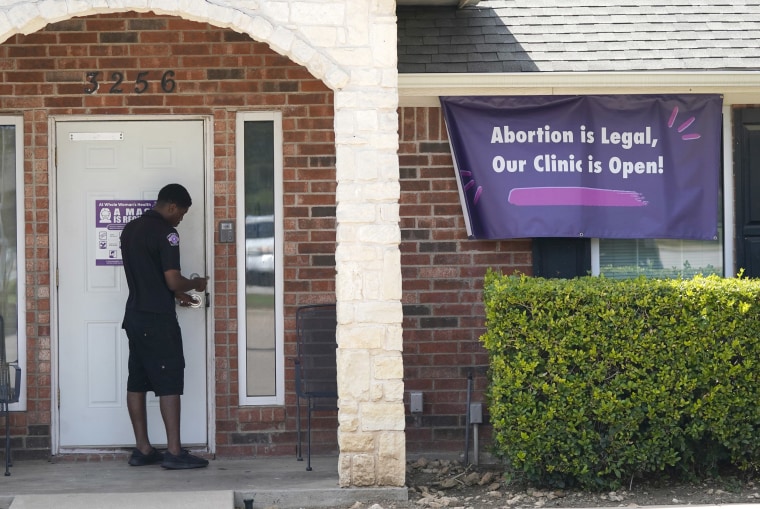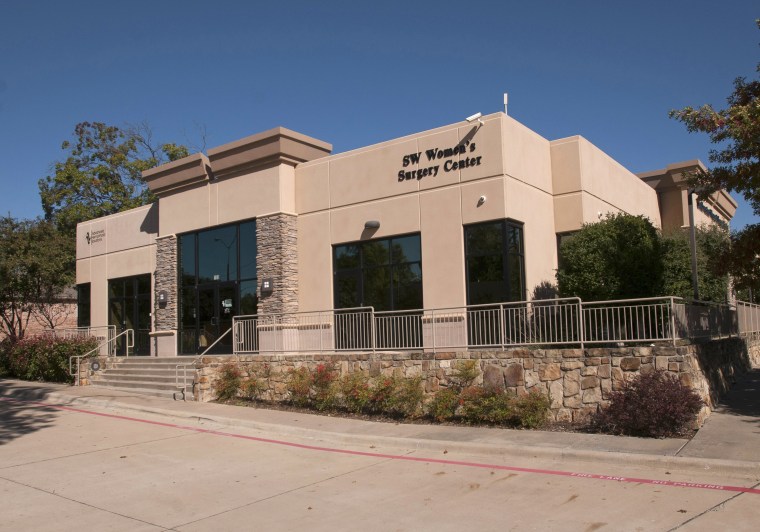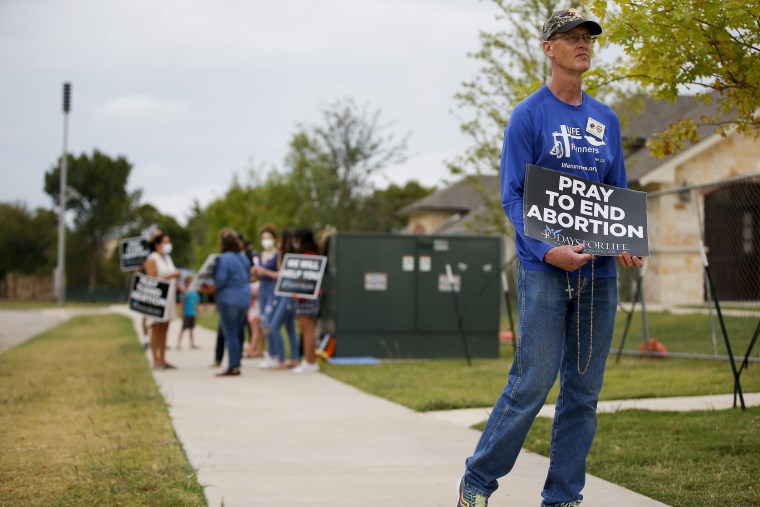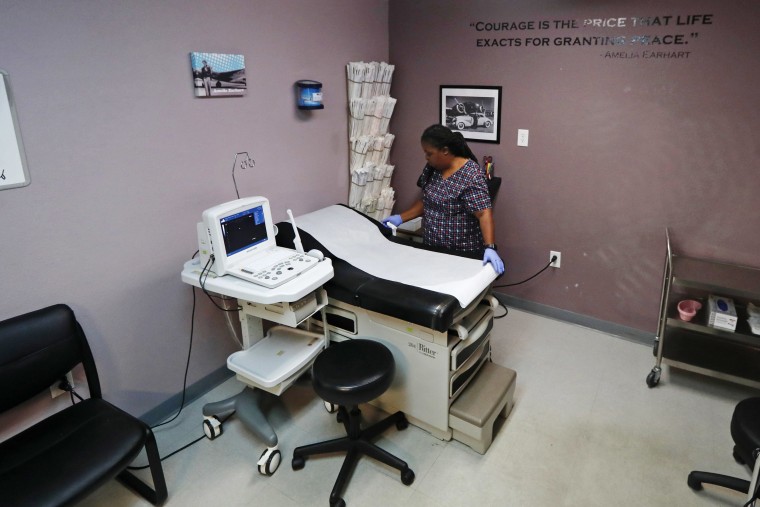For much of the past two months, Amy Hagstrom Miller said her abortion clinics have been brought to a standstill since Texas imposed the country’s most restrictive abortion law that cuts off access before most women know they are pregnant.
"It's like we’re frozen in time," said Hagstrom Miller, president and CEO of Whole Woman's Health and Whole Woman's Health Alliance. "My staff has to say no all the time, which is psychologically and emotionally difficult because they are trained to see everybody, but under this law, they have to serve as agents of the state and deny people care.”
In September, the law took effect, known as Senate Bill 8, which forbids abortions once cardiac activity is detected, typically around six weeks of pregnancy. Consequently, women are carrying their unwanted pregnancies to term or crossing state lines to obtain an abortion. The law also prohibits state officials from enforcing the ban. Instead, it allows individuals to sue abortion providers or anyone who may have helped someone get an abortion after the time limit and seek financial damages of at least $10,000 per defendant.

Complying with the near-total ban on abortion has dramatically decreased the volume of women obtaining care in the state. In September, the number of abortions performed in Texas declined 50 percent from the same month in 2020, according to the Texas Policy Evaluation Project at the University of Texas, Austin. Providers, meanwhile, have scaled back or stopped providing a bulk of their abortion services, ultimately putting many independent clinics, like Whole Woman's Health, at risk.
Independent clinics, which are often for-profit, are vulnerable to abortion restrictions because they lack visibility, institutional support or financial resources of other providers, like Planned Parenthood, to comply with new regulations or keep their doors open while cases make their way through the court system.
“These are clinics that are surviving day by day. There is no huge safety net to help them through difficult times like this,” said Molly Duane, a senior staff attorney at the Center for Reproductive Rights, who represents several clinics in Texas challenging the ban.
“Doctors, who have been struggling to provide abortion care to patients, may not be able to do so a week or a month from now because the state of Texas passed a blatantly unconstitutional law,” she added.
Independent clinics provide 3 out of every 5 abortions in the United States each year. Although they represent some 25 percent of the facilities offering abortion care, independent clinics provide more than half of all abortions in the country.
Whole Woman’s Health — which operates four Texas clinics — experienced a dip in the number of completed abortions since S.B. 8 took effect. During the last week of October, Whole Woman’s Health in Fort Worth provided 20 abortions compared to 90 the same week in 2020, Hagstrom Miller said. She added that her clinics “feel a sense of doom” and have reduced the number of days they offer abortion services from five to as little as two days a week.
She said her clinics have used reserve funds and secured additional grants to offset some of their losses under the new law. However, she added, “It’s not going to last forever.”
Similarly, the Southwestern Women’s Surgery Center in Dallas typically provides 9,000 abortions a year, roughly 200 abortions a week. Under the new law, the clinic provides about 50 abortions a week, according to Dr. Allison Gilbert, the medical director at the clinic.

She said the law has also forced the center to decrease the number of days it provides abortion services to three days a week instead of five. While the clinic hasn’t experienced layoffs, it has reduced staff hours and is rotating employees between Dallas and their sister clinic in Albuquerque, New Mexico, which has experienced an uptick in Texas patients since the restrictive law took effect.
“We keep holding our breath that every day we’re going to get a judgment from the Supreme Court because each day it significantly impacts our ability to stay open,” Gilbert said.
For Carol Tobias, president of the National Right to Life Committee, the new law is a win for the anti-abortion movement.
“Lives are being saved, and what we have been working on for the last 50 years is coming to fruition. In the coming years, we are going to see much more laws that protect unborn babies,” she said, adding that the dip in abortions provided in the state is “good for babies, mothers, and certainly Texas.”

Katie Glenn, government affairs counsel at Americans United for Life, agreed and said the current state of abortion access in Texas "gives us a window into what a post-Roe America looks like."
But, she said S.B. 8 isn't the "end goal" for anti-abortion advocates and lawmakers; instead, they want to see states gain more power and employ their own rules and practices on abortion, as was the case before Roe v. Wade.
"When Roe is overturned, it doesn't mean there will be zero abortions in the United States; it means the issue of abortion goes back to the states, so people and their elected officials get a say," Glenn said.
Still, if S.B. 8 continues to stay in place for an extended time or if providers are sued and later found guilty of violating the law, abortion advocates and providers warn that independent clinics could shut down. If clinics close, Gilbert said, it’s “going to mean fewer procedure days, and it will be the difference between someone getting an abortion and someone not getting an abortion.”
Even if abortion services are allowed to resume beyond six weeks in Texas — while the legal battle plays out — some providers may not be willing to offer care past that point out of fear of being retroactively sued if the law is later ruled constitutional.
Already, independent clinics around the U.S. are closing rapidly due to mounting abortion restrictions, the coronavirus pandemic and the subsequent recession. Over the last two years, 41 independent clinics closed around the country; of those clinics, 76 percent provided abortion care after the first trimester, according to the Abortion Care Network’s 2020 report.
“Unfortunately, when abortion clinics shutter, they generally do not reopen, and we cannot afford to lose any of them,” said Erin Grant, deputy director of Abortion Care Network, a national association of independent abortion providers.
In 2013, Texas passed a major anti-abortion law, House Bill 2, that required doctors who perform abortions to have admitting privileges within 30 miles of the clinic and ordered clinics to meet the requirements of ambulatory surgical centers. As a result, more than half of the state's 41 abortion clinics shut down, according to the Texas Policy Evaluation Project. While the law was later overturned in a 2016 Supreme Court ruling, Whole Woman's Health v. Hellerstedt, many clinics could not reopen.
Currently, only 23 clinics, about half the number of clinics in Texas before H.B. 2, are open.
“Our opposition has crafted these laws to disrupt services. They haven’t been successful so far in repealing Roe, but they have been successful at creating so many barriers that some patients can never make it to us, and then some clinics close in the process,” Hagstrom Miller said.

